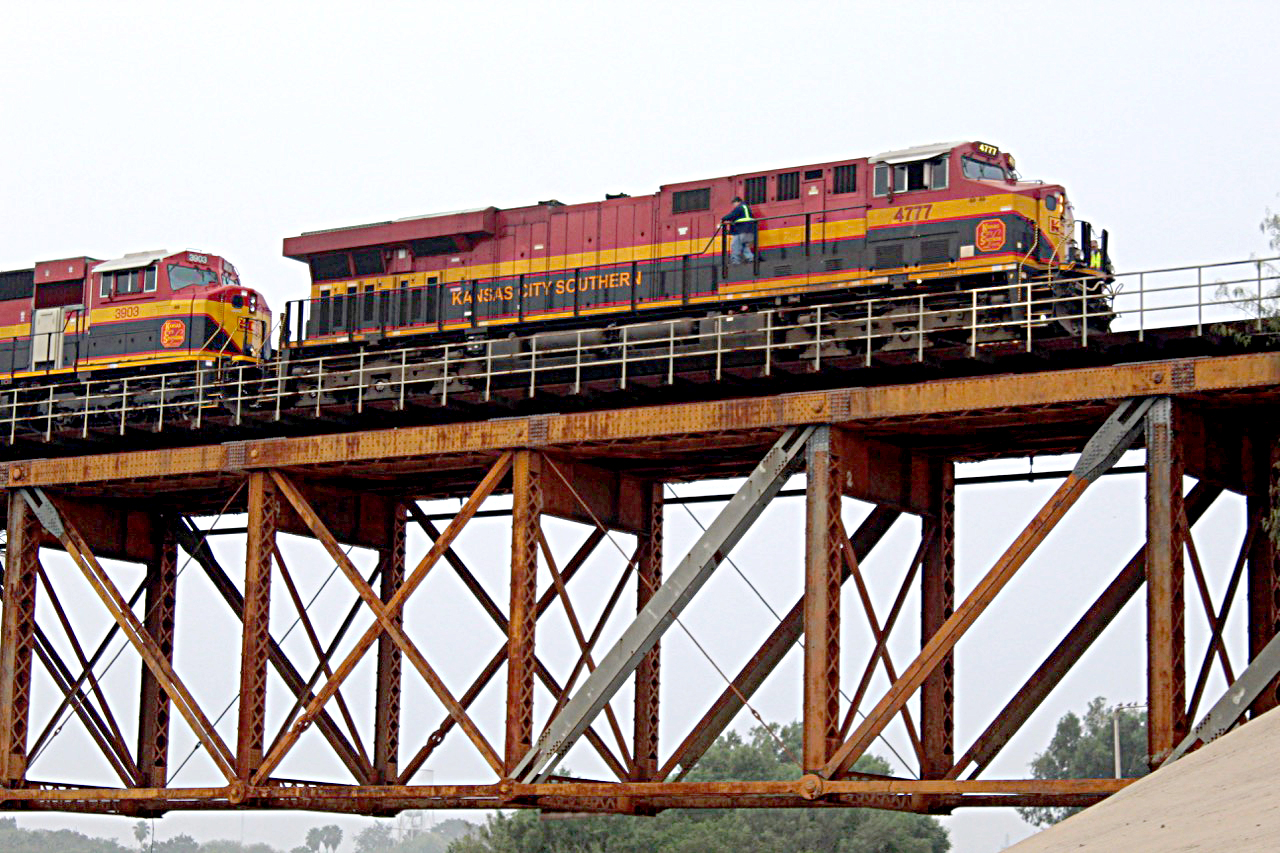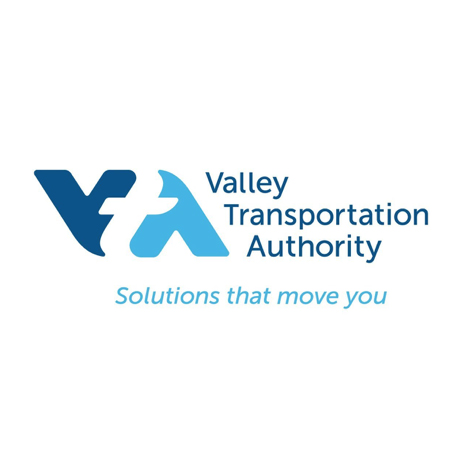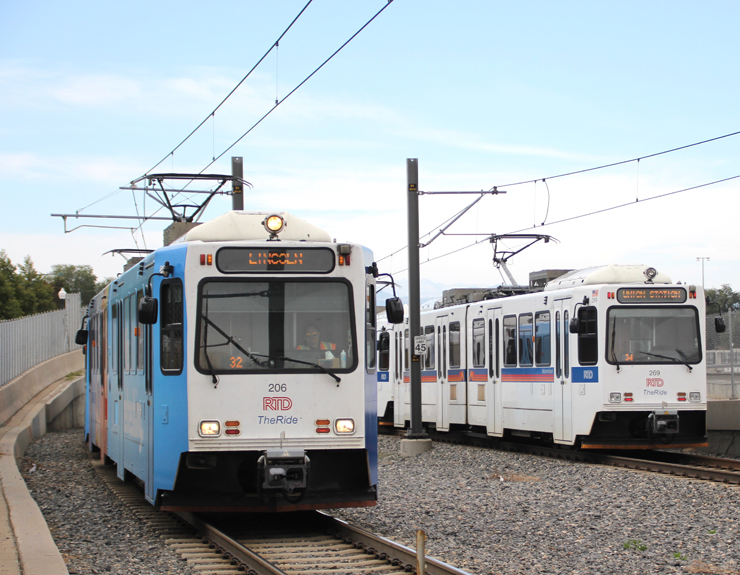Currently, cross-border trains change crews on the International Bridge linking Laredo and Nuevo Laredo, Mexico, tying up the single-track span at the busiest U.S.-Mexico rail freight gateway.
KCS wants to use international, or Mexican, crews, who would run between Laredo Yard in the U.S. and either Nuevo Laredo or Sanchez yards in Mexico.
KCS also would like to have international crews handle Union Pacific interchange trains between UP’s Laredo Yard and Nuevo Laredo and Sanchez yards, but it was not immediately clear if that was part of the proposed changes.
In a June 27 letter to KCS, BLET National President Dennis Pierce and Chris Heise, the union’s general chairman for KCS subsidiary Texas Mexican Railway, rejected a May memorandum of understanding between the railway and the union.
They said the union would begin a strike at 12:01 a.m. on July 9 if KCS began using international crews, as KCS indicated it would do. If KCS backs away from its plan, union members would remain in service.
“KCSR and Tex-Mex are implementing new interchange procedures at the U.S.-Mexican border in order to improve efficiency, security, and capacity in cross-border rail operations. The changes at issue will reduce the frequency of blocked road crossings in and around Laredo, which have been a source of concern for many years,” says Doniele Carlson, the railroad’s assistant vice president for corporate communications.
“The railroads have a clear right under their existing agreements with the unions to implement the new interchange procedures, and any dispute over this matter is subject to binding arbitration,” she adds. “Accordingly, KCSR has filed an action in federal court to enjoin the threatened strikes by the union, which would harm not just KCSR, but also other rail carriers, shippers, and the general public.”
The union says KCS de Mexico predecessors were not party to a 1971 national agreement in the U.S. and that the use of international crews conflicts with pledges KCS made to the Surface Transportation Board in 2004 that it would maintain the terms of all existing Tex-Mex labor agreements.
Pierce and Heise also raised safety concerns over the use of Mexican crews between the bridge and Laredo Yard, questioning their training, certification, and ability to speak English.
Labor unions have traditionally been critical of the North American Free Trade Agreement. Pierce urged all BLET members to fight to preserve jobs.
“The American middle class has been severely harmed by the exporting of jobs under NAFTA,” Pierce said in a union news flash. “Now, multi-national KCS wants to import workers to replace American train crews in Laredo; all BLET members must unite to repel this corporate attack on our Brothers and Sisters.”
NAFTA has created more jobs for KCS and Tex-Mex workers as cross-border traffic has made KCS the fastest-growing Class I system for more than a decade.
The Tex-Mex was a sleepy 154-mile route linking Laredo and Corpus Christi when KCS took a 49-percent stake in the railroad back in 1996. Fifteen years ago, the Tex-Mex handled only one through train a day in each direction. Now the upgraded route, a key link in the KCS cross-border network, carries as many as 15 trains per day.















My memory is about 20 years old, but KCS’ Laredo Yard is about 3 miles from the bridge. I possibly remember ‘Yard Crews’ switching across the bridge including both KCS and UP. Yes, all crew members must be able to speak English but perhaps these crews (US/Mexican) could be dove-tailed together as one group – bringing trains in both directions.
On the Canadian-U.S. Border crews from both sides cross the border to yard and pick up trains..At points I am familiar with crews can operate as far as yard limit signs but they must be conversant in operating rules in both countries. Crew members must have passports and be pre cleared for customs. An example of co-operation is CP at Portal ND-North Portal Sask where the yard is located in ND but the crew rest house is in Sask.
Christopher said, “Seems like a pretty big deal for what sounds like just moving the crew change point to the other side of town.”
Gerald said, “This sounds like a playground argument between little children, no one is losing their jobs.”
I don’t think we know this, at least from the information provided in the article. But if either of you have additional information, please enlighten us.
But this is the way this looks to me from the KCS vantage point: I would guess that that the next crew change point for KCS trains beyond Laredo on the U.S. side is Robstown/Corpus Christi or Victoria. Given the chronic congestion associated with crossing the border at Laredo/Nuevo Laredo, I believe it’s very likely that the KCS crew handling a cross-border train only does so from the KCS yard to the international bridge, or from the international bridge to the KCS yard, and no further. In other words, it’s highly unlikely that an inbound crew from Robstown would take the train to the international bridge, simply because hours of service would not permit it due to congestion (staging) southbound, and congestion and customs northbound (and that U.S. Immigration thoroughly inspects every eastbound/northbound train at Hebbronville, TX., causing delay). So, a separate crew is necessary to take the train to/from the border when the train can be accommodated. Same on the Mexican side probably through their hours of service rules are probably less rigid (I don’t know). If this is the case, then indeed there would be a loss of KCS jobs on the U.S. side because the “transfer” (KCS) crew handling the train to/from the border would be replaced by a Mexican crew taking the train all the way from wherever in Nuevo Laredo to the KCS yard east of Laredo.
Just take a look at Google Earth and it’s obvious that NOT stopping to change crews on the bridge is a good idea, especially southbound. As stated in the article, the former Texas-Mexican railroad through Laredo has many, many grade crossings. Even if a train is pre-cleared to cross the border, there is always the possibility of a last-minute delay including a delayed train to/from the UP. The UP doesn’t have as much of a problem as their yard is immediately north of the bridge, and grade crossings are not an issue.
Having determined this is a good idea does not answer the question of who’s right in the dispute. That can only be determined by the agreement between the union and railroad. And that’s always an important consideration. Remembering that the word agreement means both sides agreed, so therein must lie the solution. If the agreement doesn’t allow this (and that appears to be the case, since the railroad mentioned binding arbitration), then the agreement should be changed to allow operations to change. On the other hand, the quote by the union official about exporting jobs under NAFTA is hypocritical since many could argue those jobs being exported include goods the union people are handling on KCS trains beyond Laredo. And, it has nothing to do with the agreement. I think some of this is a change of railroads (in the case of UP especially) and that it’s Mexico instead of somewhere else. American crews handle trains in and out of Canada probably 25 times a day at Blaine, Washington/White Rock, British Columbia.
As for Mr. Landey’s initial comment about unions that he claims he doesn’t hate: The only thing that would stink worse than a rotting corpse would be the drinking water, air, and conditions most of us would have to endure at a workplace in this country if it had not been for unions initially fighting to provide the basic necessities we all take for granted – represented or not.
Mr. Bauer: I am sorry if I was not clear enough. I did not intend to say that the 10 mile job was all their work for the day. I was trying to say that it would seem more efficient to take the train all the way to the next yard, and then move the following transfer job back to the original yard. That would seem to be better than making possibly unsafe walks across a bridge and being driven back for another job from the original yard.
airliners from all over he world cross borders
On the train from Toronto to New York in 2016 the Amtrak crew crossed into Canada to bring the train into the US. I know this because my train was stuck on the Canadian side for over an hour because the Amtrak crew was was not being allowed across the border by the Canadians.
If Mexican truck drivers can go all the way to Canada on our highways, why cannot Mexican rail crews operate a yard transfer across the border?
The union is a big deal out of this. A simple solution would be to have a dedicated crews from American side and Mexico side having passport for both sides. allow American crew to take train into Mexico and then bring back a train for America or the Mexico crew bring a train into America and bring one back to Mexico. This would make for a smoother way and less wasted time to exchange freight between the border.
I’m troubled by the language used by Mr. Pierce. He talks of “Importing” workers to replace American crews. He talks of this being a corporate “Attack” on the American workers. He’s making this into a lot more than it is. For some reason he’s seeking belligerent confrontation.
KCS wants to move a crew change point a short distance so the train goes to a yard. That seems to make sense. Mr. Pierce seems to be seeking an issue to fight over.
Seems like a pretty big deal for what sounds like just moving the crew change point to the other side of town.
Surely both sides should be able to compromise. Instead of crews changing mid bridge, why don’t both KCS crews run straight through to Nuevo Laredo and come back on the next train north and vice versa for the Tex-Mex crews? We are apparently talking about a 20 mile transfer run, which now has a crew run 10 miles and get transported back doing no work. Also, surely there are plenty of hazards, particularly in bad weather for one crew walking out to the middle of the bridge and the released crew walking back. Finally, KCS is correct abotu the need to reduce the time highways are blocked, which must be considerable for trains stopped for such a crew change.
This sounds like a playground argument between little children, no one is losing their jobs, crew change points are changed all the time and what difference does it make if the crew speaks English or Mexican(don’t say Spanish because that is spoken in Spain). BLET just wants to live in the past and not move into the 21st Century at this point, I don’t think they’re going to find a sympathetic ear in court.
Charles just hates all unions…..even though he no doubt benefited from the 40 hour work week, over-time, health, retirement, and vacation and of course on the job safety. I am sure he has read the agreement the union has with KCS and knows ALL the details.
NAFTA has cost American workers millions of good jobs. Greedy corporate executives move jobs to Mexico to stuff more in their pockets.
KCS is doing EXACTLY the same thing. How much does a Mexican engineer or conductor get paid? This has nothing to do with “smoothing” operations. It is all about stateless corporate greed.
MARK – Do I hate all unions? No I don’t hate anybody, I just think unions have had their day (prior to around 1970) and have been useless for many decades. I won’t bore you with my years of experience with union obsolescence. Just believe me, I’ve been there, done that. I’ve known a whole lot of really great, dedicated workers (many of them, not all of them, Republicans) who belonged to unions (Democrat party front groups) that had no remaining cause to exist.
Labor unions complain about a treaty that has increased trade from a train pair a day to 7.5 train pairs a day. Typical union mentality. Workers are great and unions stink like a rotting corpse.
Ed, thanks for Google Translate! Most Canadian train crews speak English
Martin, La plupart des équipes des trains canadiens parlent Anglais
How is this issue handled between the US and Canada?
Mark Thomas you read my mind. Only I probably would not have been as polite in my reply. I was going to ask him the same thing. As far as the comment James made, I highly doubt the crew is being called on duty to take a train 10 miles and then deadhead back and that is their day. I just love how the railfan community loves the workers if they get intel, or a horn blast or anything else that benefits them, but when a work issue comes up between labor and management well by god we are all overpaid disgruntled workers. Huge part of the reason I went on the railfan 12 step program 3 years ago and am doing quite well not chasing trains anymore. The job has become just a paycheck to me. Now, if the “If you dont like your job just quit” crowd replies back, to that I will simply answer “that doesn’t solve the root cause of the problem does it?
If I’m reading this correctly KCS wants to have Mexican crews run into the yard in Laredo.